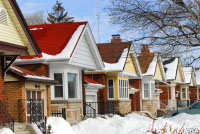 (ARA) – Yes, improving insulation and installing programmable thermostats can help reduce home heating costs during the winter. But did you know that keeping rodents, birds and other unwelcome animals out can also help curb heating expenses? Or that it can be significantly cheaper to heat only the areas of a home that you actually use?
(ARA) – Yes, improving insulation and installing programmable thermostats can help reduce home heating costs during the winter. But did you know that keeping rodents, birds and other unwelcome animals out can also help curb heating expenses? Or that it can be significantly cheaper to heat only the areas of a home that you actually use?
‘While prices of everything from groceries to clothing keep going up, the expense of heating their homes is probably front-of-mind for a lot of Americans as winter arrives,’ says Dave Kogan, a technician with Bird-X, a company that specializes in products that help keep animal pests out of residences and businesses. ‘Not only do uninvited animal ‘guests’ cause homeowners the expense of getting rid of them and repairing the damage they leave behind, they can actually affect home heating bills as well.’
That’s because many animals looking to come inside for the winter prefer to settle in areas most vulnerable to heat loss – like the attic. A family of rodents may chew a hole in the roof or siding to get in, and then tear up insulation to build a nest. Compromised insulation means an attic retains less heat. Mice, raccoons, bats, squirrels and other rodents can all contribute to a home’s heat loss with their comings and goings.
‘While there isn’t much you can do about the cost of heating oil or natural gas, you can minimize potential pest impact on your heating expenses by ensuring animals never get in,’ Kogan says.
Rely on non-lethal removal and deterrent methods, he advises, because killing pests means you’re simply clearing the way for more to move in. Instead, convince pests that a location is undesirable and they’ll go away — and others will get the message and avoid the area as well. Non-lethal methods are also safer for your family and pets since they won’t be exposed to toxic substances.
For bats, other rodents and insects, sound deterrents can be very effective. Sonic and ultrasonic devices like the Transonic PRO are proving successful in keeping these pests away from human habitations. Taste deterrents, like Bird-X’s Scoot product line, are also effective, particularly for squirrels. Visual deterrents, like Irri-Tape, a glistening strip of plastic that motivates visually and through motion, are good for keeping birds from roosting in your attic.
Once you’ve ensured your home is protected against heat loss caused by animals, next consider heating only the areas you use. If you have a bonus room over your garage that is rarely used in the winter, close vents in that room and keep the door closed. Likewise, don’t waste money heating laundry rooms, especially those that are situated between the main part of your house and the garage, where major heat loss can occur.
When you’re at home, consider using energy-efficient electric space heaters. Oil and kerosene heaters present tipping and fire hazards, and they emit greenhouse gases. Modern electric space heaters like the Toasty Toes or Cozy Legs by Indus-tool provide maximum safety and efficiency. These flat heaters put the warmth right where it’s needed most – on feet and legs – rather than inefficiently trying to heat an entire area.
To learn more about animal repellent products, visit www.Bird-X.com. For more information on high-efficiency electric space heaters, go to www.Indus-tool.com.
Courtesy of ARAcontent
